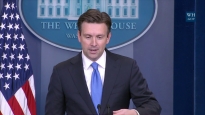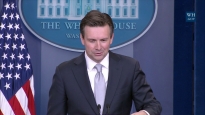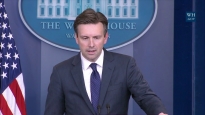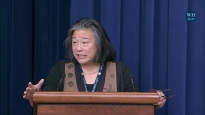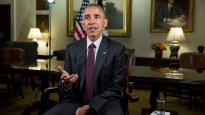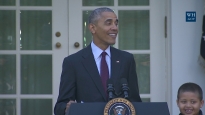President Obama on Wall Street Reform Vote
July 15, 2010 | 7:09 | Public Domain
The President praises Congress for passing a financial reform package that brings new accountability to Wall Street and helps provide economic security to individuals, families and businesses.
Remarks by the President on the Passage of Financial Regulatory Reform
4:43 P.M. EDT
THE PRESIDENT: Good afternoon, everybody. With today’s vote in the Senate, the United States Congress has now passed a Wall Street reform bill that will bring greater economic security to families and businesses across the country.
It was clear from the moment it began that this recession was not the result of your typical economic downturn. It was the result of recklessness and irresponsibility in certain corners of Wall Street that infected the entire economy –- irresponsibility that cost millions of Americans their jobs, and millions more their hard-earned savings. It’s why businesses cannot get credit and why families haven’t been able to see appreciation in their home values -- in fact, the values of their homes have plummeted.
Even before the financial crisis that led to this recession, I spoke on Wall Street about the need for common-sense reforms to protect consumers and our economy as a whole. But the crisis came, and only underscored the need for the kind of reform the Senate passed today -- reform that will protect consumers when they take out a mortgage or sign up for a credit card; reform that will prevent the kind of shadowy deals that led to this crisis; reform that would never again put taxpayers on the hook for Wall Street’s mistakes.
The reform that Congress passed today will accomplish these goals. It is a bill that was made possible first and foremost by the tireless efforts of Chairman Chris Dodd and Congressman and Chairman Barney Frank, as well as the leadership of Harry Reid and Nancy Pelosi. I am extraordinarily grateful for their determination in the face of a massive lobbying effort from the financial industry, and I’m also grateful for all of the members of Congress who stood on the side of reform -- including three Republican senators who put politics and partisanship aside today to vote for this bill.
The financial industry is central to our nation’s ability to grow, to prosper, to compete and to innovate. This reform will foster that innovation, not hamper it. It’s designed to make sure that everyone follows the same set of rules, so that firms compete on price and quality, not on tricks and traps. It demands accountability and responsibility from everybody. It provides certainty to everyone from bankers to farmers to business owners to consumers. And unless your business model depends on cutting corners or bilking your customers, you have nothing to fear from this reform.
For all those Americans who are wondering what Wall Street reform means for you, here’s what you should expect. If you’ve ever applied for a credit card, a student loan, a mortgage, you know the feeling of signing your name to pages of barely understandable fine print. It’s a big step for most families, and one that’s often filled with unnecessary confusion and apprehension. As a result, many Americans are simply duped into hidden fees and loans they just can’t afford by companies who know exactly what they’re doing.
Those days will soon end. From now on, every American will be empowered with the clear and concise information you need to make financial decisions that are best for you. This bill will crack down on abusive practices and unscrupulous mortgage lenders. It will reinforce the new credit card law we passed banning unfair rate hikes, and ensure that folks aren’t unwittingly caught by overdraft fees when they sign up for a checking account. It will give students who take out college loans clear information and make sure lenders don’t cheat the system. And it will ensure that every American receives a free credit score if they are denied a loan or insurance because of that score. All told, this reform puts in place the strongest consumer financial protections in history, and it creates a new consumer watchdog to enforce those protections.
Because of this reform, the American people will never again be asked to foot the bill for Wall Street’s mistakes. There will be no more taxpayer-funded bailouts -- period. If a large financial institution should ever fail, this reform gives us the ability to wind it down without endangering the broader economy. And there will be new rules to end the perception that any firm is “too big to fail,” so that we don’t have another Lehman Brothers or AIG.
Because of reform, the kind of complex, backroom deals that helped trigger this financial crisis will finally be brought into the light of day. And from now on, shareholders and other executives can know that shareholders will have greater say on the pay of CEOs, so that they can reward success instead of failure, and help change the perverse incentives that encouraged so much reckless risk-taking in the past.
In short, Wall Street reform will bring greater security to folks on Main Street -- to families who are looking to buy their first home or send their kids to college; to taxpayers who shouldn’t have to pay for somebody else’s mistakes or irresponsibility; to small businesses, community banks and credit unions who play by the rules; to shareholders and investors who want to see their companies grow and thrive.
Now, already, the Republican leader in the House has called for repeal of this reform. I would suggest that America can’t afford to go backwards, and I think that’s how most Americans feel as well. We can’t afford another financial crisis just as we’re digging out from the last one.
I said when I took office we can’t simply rebuild this economy on the same pile of sand -- on maxed-out credit cards, houses used like ATM machines, or overleveraged firms on Wall Street. We need to rebuild on a firmer, stronger foundation for economic growth. That’s why we invested in renewable energy that’s currently creating new jobs all across America. That’s why we’re reforming our education system so that our workers can compete in the global economy. That’s why we passed health reform that will lower costs for families and businesses. And that’s why I’m about to sign Wall Street reform into law -- to protect consumers and lay the foundation for a stronger and safer financial system -- one that is innovative, creative, competitive, and far less prone to panic and collapse. Along with the steps we’re taking to spur innovation, encourage hiring and rein in our deficits, this is how we’re ultimately going to build an economy that is stronger and more prosperous than it was before, and one that provides opportunity for all Americans.
Thanks very much.
Q Sir, are you encouraged that the oil has stopped flowing in the Gulf?
THE PRESIDENT: I think it is a positive sign. We’re still in the testing phase. I’ll have more to say about it tomorrow.
END 4:50 P.M. EDT
|
November 30, 2016
|
November 29, 2016
|
November 29, 2016
|
November 28, 2016
|
|
November 28, 2016
|
November 25, 2016
|
November 24, 2016
|
November 23, 2016
|
- &lsaquo previous
- …
- 5
- 6
- 7
- 8
- 9
- 10
- 11
- 12
- 13
- …
- next &rsaquo
